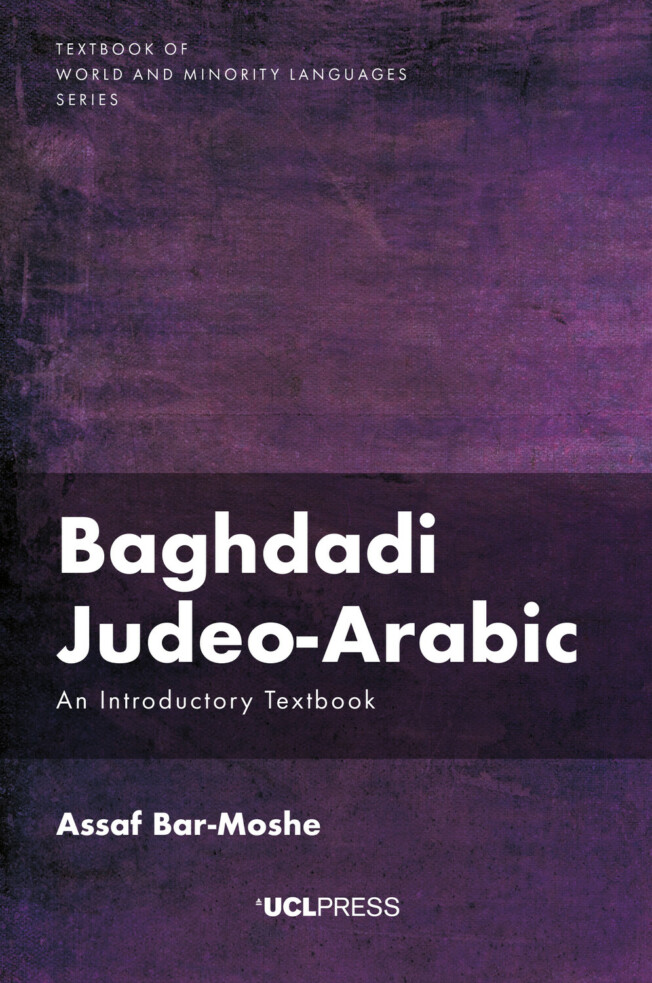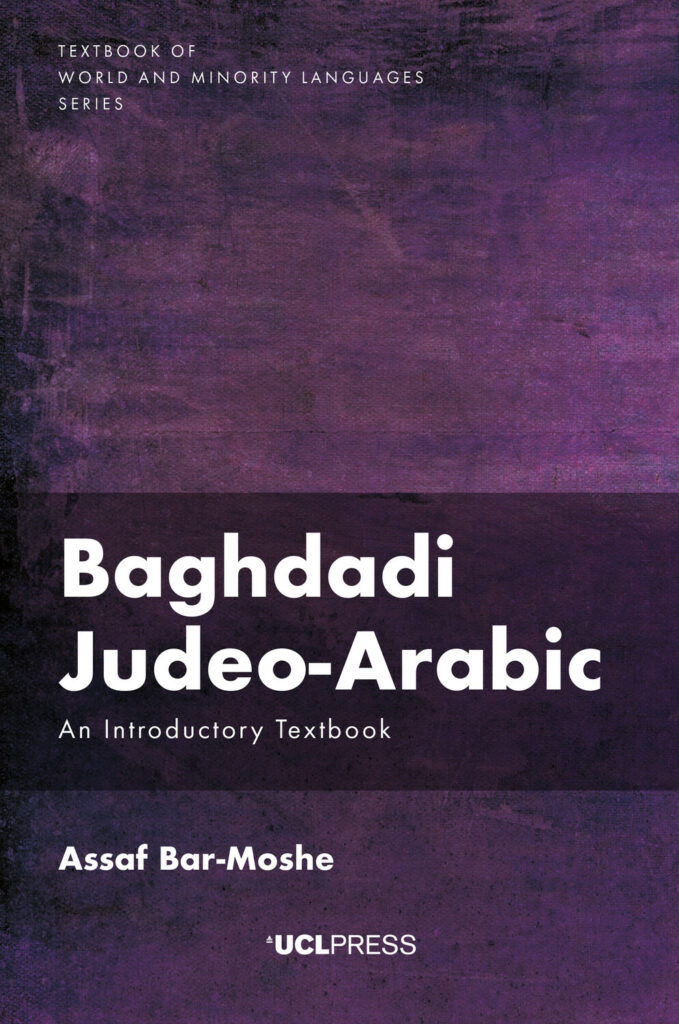
Baghdadi Judeo-Arabic
An Introductory Textbook
Assaf Bar-Moshe (Author)
Baghdadi Judeo-Arabic was the native tongue spoken by the Jews of Baghdad and other towns of Southern Iraq, historically one of the oldest and biggest Jewish communities. This textbook is dedicated to spoken Baghdadi Judeo-Arabic and is designed to guide beginners to an advanced level, with the goal of enabling basic conversations. It focuses on common expressions of this unique dialect and opens a window to Baghdad’s historic Jewish culture. The 10 lessons guide readers through a particular topic, such as greetings, family, shopping or cuisine, and consist of sample texts, key vocabulary, grammar points and exercises.
The textbook includes access to audio files, additional activities and links to the exercises.
Praise for Baghdadi Judeo-Arabic
‘Baghdadi Judeo-Arabic, distinct from the Muslim and Christian dialects of Baghdad, was spoken by Jews for over a millennium. This book is an invaluable resource for those aspiring to study and teach the spoken Arabic dialect of Baghdad, setting a benchmark for instructional textbooks on other dialects. The author is renowned authority on Iraqi Judeo-Arabic and has extensively published on Jewish Iraqi dialects. In this volume he integrates his vast pedagogical experience, skilfully blending texts, grammar, vocabulary, and exercises focused on daily life. This book significantly contributes to the ongoing efforts to document, preserve, and study this notable dialect, thereby ensuring its preservation from oblivion.’ Ofra Tirosh-Becker, Professor and Head of the Center for Jewish Languages, Hebrew University of Jerusalem, Israel
‘This textbook comes at a time of increasing interest in Judeo-Baghdadi language and culture, as Jews of Iraqi descent recognize the urgency of learning the language from their Arabic-speaking relatives. Students will find this book easy to use, either in a class context or on their own.’ Sarah Bunin Benor, Founding Director, HUC-JIR Jewish Language Project, and Founding Co-editor, Journal of Jewish Languages
Preface
Symbols and abbreviations
Introduction
Lesson 1. Greetings
Lesson 2. Getting to know someone
Lesson 3. Buying vegetables and visiting the doctor
Lesson 4. Food, drinks and travelling
Lesson 5. Work, studies and places of origin
Lesson 6. Inviting someone to eat, locations and transport
Lesson 7. Family, shopping and dating
Lesson 8. Giving directions, cooking, immigration stories
Lesson 9. Gossiping
Lesson 10. Seasons and short stories
Appendix I
Appendix II
Appendix III
Bibliography
Online resources
DOI: 10.14324/111.9781800086616
Publication date: 28 November 2024
PDF ISBN: 9781800086616
EPUB ISBN: 9781800086630
Hardback ISBN: 9781800086623
Paperback ISBN: 9781800087583
Assaf Bar-Moshe (Author)
Dr Assaf Bar-Moshe is based at Freie Universität, Berlin and acts as a visiting instructor at the Oxford School of Rare Jewish Languages.
‘Baghdadi Judeo-Arabic: An Introductory Textbook is a remarkable achievement. It offers a rare combination of linguistic, pedagogical, and cultural value, providing learners with the tools not only to study a language, but to engage with a rich and complex heritage’
Journal of Semitic Studies
‘Baghdadi Judeo-Arabic, distinct from the Muslim and Christian dialects of Baghdad, was spoken by Jews for over a millennium. This book is an invaluable resource for those aspiring to study and teach the spoken Arabic dialect of Baghdad, setting a benchmark for instructional textbooks on other dialects. The author is renowned authority on Iraqi Judeo-Arabic and has extensively published on Jewish Iraqi dialects. In this volume he integrates his vast pedagogical experience, skilfully blending texts, grammar, vocabulary, and exercises focused on daily life. This book significantly contributes to the ongoing efforts to document, preserve, and study this notable dialect, thereby ensuring its preservation from oblivion.’
Ofra Tirosh-Becker, Professor and Head of the Center for Jewish Languages, Hebrew University of Jerusalem, Israel
‘This textbook comes at a time of increasing interest in Judeo-Baghdadi language and culture, as Jews of Iraqi descent recognize the urgency of learning the language from their Arabic-speaking relatives. Students will find this book easy to use, either in a class context or on their own.’
Sarah Bunin Benor, Founding Director, HUC-JIR Jewish Language Project, and Founding Co-editor, Journal of Jewish Languages
Extra resources for Baghdadi Judeo-Arabic
Audio recording 0.1.1.1 to accompany section on simple consonants.
Audio recording 0.1.1.2 to accompany section on germinate consonant
Audio recording 0.1.2.1 to accompany section on long vowels
Audio recording 0.1.2.2 to accompany section on short vowels
Audio recording 0.1.3 to accompany section on stress of word
Audio recording 0.2 to accompany section on roots and patterns
Audio recording 1.1.1 to accompany section on Lesson 1: Greetings / (Hi!)
Audio recording 1.1.2 to accompany section on Lesson 1: Greetings / (What is your name?)
Audio recording 1.1.3 to accompany section on Lesson 1: Greetings / (Good evening!)
Audio recording 1.1.4 to accompany section on Lesson 1: Greetings / (Thank you!)
Audio recording 1.1.5 to accompany section on Lesson 1: Greetings / (How are you?)
Audio recording 1.2 to accompany section on Lesson 1: Vocabulary
Audio recording 1.4.12 to accompany section on Lesson 1: Transcribe and Translate
Audio recording 2.1 to accompany section on Lesson 2: Getting to Know Someone / (Who is this?)
Audio recording 2.4.12 to accompany section on Lesson 2: Transcribe and Translate
Audio recording 3.1.1 to accompany section on Lesson 3: Buying Vegetables and Visiting the Doctor / (Vegetables)
Audio recording 3.1.2 to accompany section on Lesson 3: Buying Vegetables and Visiting the Doctor / (I am sick)
Audio recording 3.2 to accompany section on Lesson 3: Buying Vegetables and Visiting the Doctor / Vocabulary
Audio recording 3.4.10 to accompany section on Lesson 3: Buying Vegetables and Visiting the Doctor / Transcribe and Translate
Audio recording 4.1.1 to accompany section on Lesson 4: Food, Drinks and Travelling / (do you want a drink Laban?)
Audio recording 4.1.2 to accompany section on Lesson 4: Food, Drinks and Travelling / (when are you travelling?)
Audio recording 4.2 to accompany section on Lesson 4: Food, Drinks and Travelling / Vocabulary
Audio recording 4.4.9 to accompany section on Lesson 4: Food, Drinks and Travelling / Transcribe and Translate
Audio recording 5.1.1 to accompany section on Lesson 5: Work, Studies and Place of Origin / (how are the kids?)
Audio recording 5.1.2 to accompany section on Lesson 5: Work, Studies and Place of Origin / (where is he from?)
Audio recording 5.2 to accompany section on Lesson 5: Work, Studies and Place of Origin / Vocabulary
Audio recording 5.4.10 to accompany section on Lesson 5: Work, Studies and Place of Origin / Transcribe and Translate
Audio recording 6.1.1 to accompany section on Lesson 6: Inviting someone to eat, Locations and Transportation / (what did you eat today?)
Audio recording 2.2 to accompany section on Lesson 2: Getting to Know Someone / Vocabulary
Audio recording 6.1.2 to accompany section on Lesson 6: Inviting someone to eat, Locations and Transportation / (this or that?)
Audio recording 6.1.3 to accompany section on Lesson 6: Inviting someone to eat, Locations and Transportation / (bus, train, bicycle
Audio recording 6.2 to accompany section on Lesson 6: Inviting someone to eat, Locations and Transportation / Vocabulary
Audio recording 6.4.12 to accompany section on Lesson 6: Inviting someone to eat, Locations and Transportation / Transcribe and Translate
Audio recording 7.1.1 to accompany section on Lesson 7: Family, Shopping, Dating / (your family)
Audio recording 7.1.2 to accompany section on Lesson 7: Family, Shopping, Dating / (what did you buy?)
Audio recording 7.1.3 to accompany section on Lesson 7: Family, Shopping, Dating / (I am inviting you)
Audio recording 7.2 to accompany section on Lesson 7: Family, Shopping, Dating / Vocabulary
Audio recording 7.4.10 to accompany section on Lesson 7: Family, Shopping, Dating / Transcribe and Translate
Audio recording 8.1.1 to accompany section on Lesson 8: Giving Directions, Cooking, Immigration Stories / (how do I get to the city hall?)
Audio recording 8.1.2 to accompany section on Lesson 8: Giving Directions, Cooking, Immigration Stories / (blessed be your hands!)
Audio recording 8.1.3 to accompany section on Lesson 8: Giving Directions, Cooking, Immigration Stories / (one-way ticket)
Audio recording 8.2 to accompany section on Lesson 8: Giving Directions, Cooking, Immigration Stories / Vocabulary
Audio recording 8.4.12 to accompany section on Lesson 8: Giving Directions, Cooking, Immigration Stories / Transcribe and Translate
Audio recording 9.1 to accompany section on Lesson 9: Gossiping / (do not ask!)
Audio recording 9.1 to accompany section on Lesson 9: Gossiping / Vocabulary
Audio recording 9.4.12 to accompany section on Lesson 9: Gossiping / Transcribe and Translate
Audio recording 10.1.1 to accompany section on Lesson 10: Seasons and Short Stories / (Summer and Winter)
Audio recording 10.1.2 to accompany section on Lesson 10: Seasons and Short Stories / (one helps the other)
Audio recording 10.1.3 to accompany section on Lesson 10: Seasons and Short Stories / (fortune teller)
Audio recording 10.2 to accompany section on Lesson 10: Seasons and Short Stories / Vocabulary
Audio recording 10.4.12 to accompany section on Lesson 10: Seasons and Short Stories / Transcribe and Translate
Related titles
Baghdadi Judeo-Arabic
An Introductory Textbook
Baghdadi Judeo-Arabic was the native tongue spoken by the Jews of Baghdad and other towns of Southern Iraq, historically one of the oldest and biggest Jewish communities. This textbook is dedicated to spoken Baghdadi Judeo-Arabic and is designed to guide beginners to an advanced level, with the goal of enabling basic conversations. It focuses on common expressions of this unique dialect and opens a window to Baghdad’s historic Jewish culture. The 10 lessons guide readers through a particular topic, such as greetings, family, shopping or cuisine, and consist of sample texts, key vocabulary, grammar points and exercises.
The textbook includes access to audio files, additional activities and links to the exercises.
Praise for Baghdadi Judeo-Arabic
‘Baghdadi Judeo-Arabic, distinct from the Muslim and Christian dialects of Baghdad, was spoken by Jews for over a millennium. This book is an invaluable resource for those aspiring to study and teach the spoken Arabic dialect of Baghdad, setting a benchmark for instructional textbooks on other dialects. The author is renowned authority on Iraqi Judeo-Arabic and has extensively published on Jewish Iraqi dialects. In this volume he integrates his vast pedagogical experience, skilfully blending texts, grammar, vocabulary, and exercises focused on daily life. This book significantly contributes to the ongoing efforts to document, preserve, and study this notable dialect, thereby ensuring its preservation from oblivion.’ Ofra Tirosh-Becker, Professor and Head of the Center for Jewish Languages, Hebrew University of Jerusalem, Israel
‘This textbook comes at a time of increasing interest in Judeo-Baghdadi language and culture, as Jews of Iraqi descent recognize the urgency of learning the language from their Arabic-speaking relatives. Students will find this book easy to use, either in a class context or on their own.’ Sarah Bunin Benor, Founding Director, HUC-JIR Jewish Language Project, and Founding Co-editor, Journal of Jewish Languages
‘Baghdadi Judeo-Arabic: An Introductory Textbook is a remarkable achievement. It offers a rare combination of linguistic, pedagogical, and cultural value, providing learners with the tools not only to study a language, but to engage with a rich and complex heritage’
Journal of Semitic Studies
‘Baghdadi Judeo-Arabic, distinct from the Muslim and Christian dialects of Baghdad, was spoken by Jews for over a millennium. This book is an invaluable resource for those aspiring to study and teach the spoken Arabic dialect of Baghdad, setting a benchmark for instructional textbooks on other dialects. The author is renowned authority on Iraqi Judeo-Arabic and has extensively published on Jewish Iraqi dialects. In this volume he integrates his vast pedagogical experience, skilfully blending texts, grammar, vocabulary, and exercises focused on daily life. This book significantly contributes to the ongoing efforts to document, preserve, and study this notable dialect, thereby ensuring its preservation from oblivion.’
Ofra Tirosh-Becker, Professor and Head of the Center for Jewish Languages, Hebrew University of Jerusalem, Israel
‘This textbook comes at a time of increasing interest in Judeo-Baghdadi language and culture, as Jews of Iraqi descent recognize the urgency of learning the language from their Arabic-speaking relatives. Students will find this book easy to use, either in a class context or on their own.’
Sarah Bunin Benor, Founding Director, HUC-JIR Jewish Language Project, and Founding Co-editor, Journal of Jewish Languages

